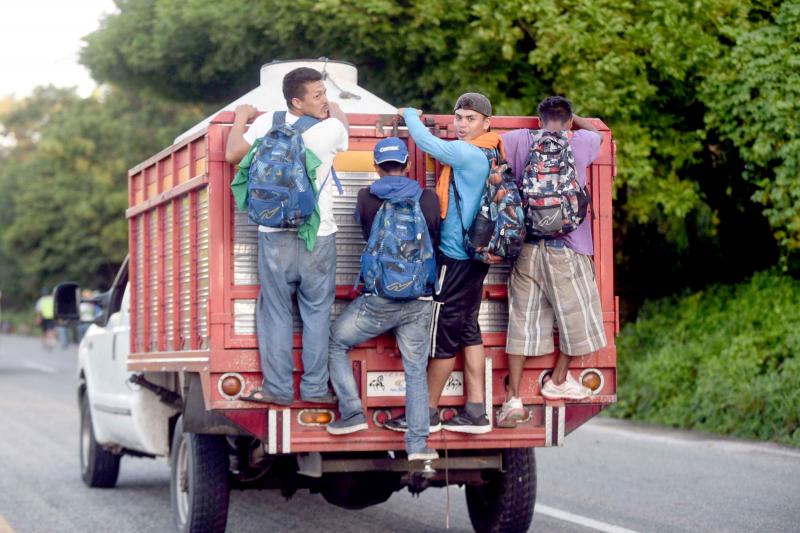US President Donald Trump and his administration are playing an insidious word association game with the American people days before the midterm elections. “Criminals and unknown Middle Easterners,” Trump said of a migrant caravan heading towards the United States’ southern border. “Terrorists or suspected terrorists… Middle East region,” repeated US Vice-President Mike Pence when discussing the caravan and people apprehended at the US border.
Word associations work, as advertising executives can attest. Add “free,” “new,” “guaranteed,” “safe” or “savings” to a brand’s message and chances are customers will buy. Word associations reveal the subconscious, as psychoanalysts will affirm. Say “Catholic” and the first word in response may be “pope” or perhaps, in a church roiled worldwide by allegations, “sexual abuse.” Say “Muslim” and the first reactive word might be “Quran” or, in our uncertain times, “jihad.”
Word association works brilliantly in politics. Trump’s game appears to be paying off, at least with Republican voters prone to believe him, as well as in the conservative media. Fox News is an enthusiastic participant. Well-known conservative broadcasters such as Rush Limbaugh and Pat Buchanan are eager players.
Right-wing conspiracy theorists such as WND.com seized on the connection Trump made between the Middle East and Central American migrants on the march. WND claimed the caravan, which set off October 13 from Honduras, includes Islamic terrorists. Its lead story October 24 quoted US Department of Homeland Security (DHS) spokesman Tyler Houlton “confirm(ing) that gang members and males from the Middle East” were in the caravan.
The mendacity and evil genius of Trump’s word game is scarcely believable. No American journalist with the caravan has heard anyone speaking Arabic nor has found anyone from outside Honduras, Guatemala and El Salvador. Mexican officials said that, in the past three years, people from the Middle East and North Africa have made up less than 0.1% of those apprehended.
It’s ridiculous anyway to think a “criminal Middle Easterner” or “terrorist” would seek to enter the United States as part of a well-publicised, highly monitored effort but, as chief executive of the world’s richest country, Trump is able to marshal vast bureaucratic resources to lend legitimacy to any presidential claim. In the 21 months Trump has been in office, US federal agencies have rushed to reverse-engineer policies or to find evidence of any sort to support the president’s theories and public statements, however bizarre or false.
In the spring, the Pentagon worked overtime to establish a “Space Force” after Trump declared at a rally that he wanted to create a sixth military branch.
Now that Trump has discerned without evidence “criminals and Middle Easterners” are in the caravan, DHS scrambled to provide a basis for the presidential claim. Accordingly, DHS said: In fiscal 2018, Customs and Border Patrol agents “apprehended 17,256 criminals, 1,019 gang members and 3,028 special interest aliens from countries such as Bangladesh, Pakistan, Nigeria and Somalia.” None of those countries is in the Middle East.
A DHS spokeswoman added: “In 2017 alone, the US apprehended on average ten suspected terrorists a day attempting to enter the country illegally and those are just the ones we catch. It’s inconceivable that this caravan, which is being broadcast around the globe, hasn’t already been infiltrated with ties to extremism.”
The problem with the DHS explanation of Trump’s claim is no evidence has been offered the suspects were actual terrorists or that they were from the Middle East. Nevertheless, a bureaucratic bubble of believability is created around Trump’s falsehoods, a buttress for the bigotry, a solid reason for Americans to link “criminals and Middle Easterners.”
As Kathleen Hall Jamieson, director of the University of Pennsylvania’s Annenberg Public Policy Centre, put it: “Whatever Donald Trump makes up and thinks about, or whatever comes to mind in the middle of a speech, actually has the reality in that it is actionable in some odd sense.” And as Ruth Ben-Ghiat, a New York University professor who specialises in fascism, authoritarianism, war and propaganda, pointed out: “(Trump is) trying to create this image of a wave of people of colour, or threats, who are coming to invade the border.”
The image Trump has created of lawless Middle Easterners bent on invading the United States is powerful and profoundly disturbing. A word picture that unfairly labels a whole region and its people is intensely emotive. It lingers, no matter what.
In the ninth century, Theodore Abu Qurrah, a Christian priest who lived in Dar al-Islam and wrote in Arabic, said images are the writing of the illiterate and words are like icons.
Trump’s word association has made the image — he has covered all bases, politically literate or not — and he has turned hate into an icon of the American way.


